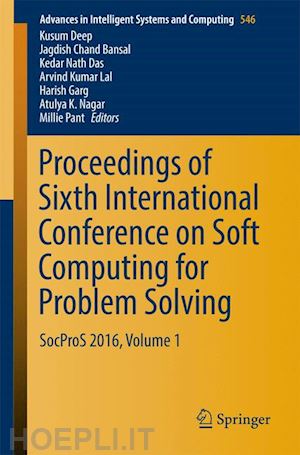
Questo prodotto usufruisce delle SPEDIZIONI GRATIS
selezionando l'opzione Corriere Veloce in fase di ordine.
Pagabile anche con Carta della cultura giovani e del merito, 18App Bonus Cultura e Carta del Docente
Prof. Kusum Deep is a Professor at the Department of Mathematics, Indian Institute of Technology Roorkee, India. Over the past 25 years, her research has made her a central international figure in the area of Nature Inspired Optimization Techniques, Genetic Algorithms and Particle Swarm Optimization.
Dr. Jagdish Chand Bansal is an Assistant Professor with South Asian University, New Delhi, India. Holding an excellent academic record, he is an outstanding researcher in the field of Swarm Intelligence at the national and international level, having written several research papers in journals of national and international repute.
Dr. Kedar Nath Das is an Assistant Professor at the Department of Mathematics, National Institute of Technology, Silchar, Assam, India. Over the past 10 years, he has made substantial contributions to research on ‘soft computing’. He has published several research papers in prominent national and international journals. His chief area of interest is in evolutionary and bio-inspired algorithms for optimization.
Dr. Arvind Kumar Lal is currently associated with the School of Mathematics and Computer Applications at Thapar University, Patiala. He received his BSc. Honors (mathematics) and MSc. (mathematics) from Bihar University, Muzaffarpur in 1984 and 1987, respectively. He completed his PhD (mathematics) at the University of Roorkee (now the IIT, Roorkee) in 1995. Dr. Lal has over 130 publications in journals and conference proceedings to his credit. His research areas include applied mathematics (modeling of stellar structure and pulsations), reliability analysis and numerical analysis.
Dr. Harish Garg is an Assistant Professor at the School of Mathematics at Thapar University, Patiala, Punjab, India. He received his BSc. (computer applications) and MSc. (Mathematics) from Punjabi University, Patiala before completing his PhD (applied mathematics) at the Indian Institute of Technology Roorkee. He is currently teaching undergraduate and postgraduate students and is pursuing innovative and insightful research in the area of reliability theory using evolutionary algorithms and fuzzy set theory with their application in numerous industrial engineering areas. Dr. Garg has produced 62 publications, which include 6 book chapters, 50 journal papers and 6 conference papers.
Prof. Atulya Nagar holds the Foundation Chair as Professor of Mathematical Sciences and is Dean of the Faculty of Science at Liverpool Hope University, UK. Prof. Nagar is an internationally respected scholar working at the cutting edge of theoretical computer science, applied mathematical analysis, operations research, and systems engineering.
Dr. Millie Pant is an Associate Professor at the Department of Paper Technology, Indian Institute of Technology Roorkee, India. She has published several research papers in national and international journals and is a prominent figure in the field of Swarm Intelligence and Evolutionary Algorithms.











Il sito utilizza cookie ed altri strumenti di tracciamento che raccolgono informazioni dal dispositivo dell’utente. Oltre ai cookie tecnici ed analitici aggregati, strettamente necessari per il funzionamento di questo sito web, previo consenso dell’utente possono essere installati cookie di profilazione e marketing e cookie dei social media. Cliccando su “Accetto tutti i cookie” saranno attivate tutte le categorie di cookie. Per accettare solo deterninate categorie di cookie, cliccare invece su “Impostazioni cookie”. Chiudendo il banner o continuando a navigare saranno installati solo cookie tecnici. Per maggiori dettagli, consultare la Cookie Policy.